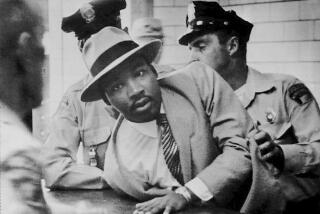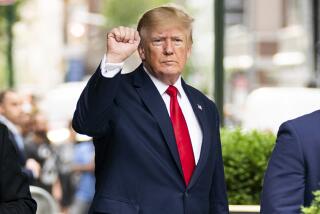A Leadership Study Without Followers : CERTAIN TRUMPETS: The Call of Leaders, <i> By Garry Wills (Simon & Schuster: $23; 304 pp.)</i>
- Share via
In the post-Cold War era, when old certainties have fled and ideologies and governments have crumbled--and global economic forces undermine the stability of daily life--there seems to be a hunger for leadership. Although often cynical about leaders, especially politicians, many Americans appear to want strong men and women to provide a way forward in confused and troubling times. Witness the appeal of independent presidential candidate Ross Perot, the rise of the Christian Right or new Black Nationalist leaders.
But don’t we already have plenty of leaders? After all, societies have individuals who occupy the top spots in government, in business enterprises, in social organizations or in hereditary bodies like a kingdom or a tribe--but does simply being in a position of authority make a person a leader? People expect a leader to lead, not simply enjoy the perks of high office and the trappings of power. This is especially true in times of change. In democratic societies and in most post-industrial organizations, except perhaps the military, a leader cannot simply issue orders and expect to be obeyed. A leader must persuade as well as command.
What, then, is leadership? Are there different kinds? Where do leaders come from? Are they born--”a natural leader”--or forged by circumstance--or “in the right place at the right time?” Can we identify leadership traits that one might cultivate or learn? And, has modern technology, especially television, transformed telegenic celebrities into leaders and pushed aside others?
These are some of the questions that come to mind when considering a book about leaders by the distinguished scholar Gary Wills, professor of Humanities at Northwestern University, who has previously written insightful books on such American political leaders as Richard Nixon, Ronald Reagan, Jack Kennedy, George Washington and Abraham Lincoln.
In his introduction, Wills makes the important, if obvious point, that a leader needs followers and is defined, in part, by them. Wills offers this definition: “The leader is one who mobilizes others toward a goal shared by leader and followers. . . . Leaders, followers, and goals make up the three necessary supports for leadership.”
Wills goes on to say that a “leader whose qualities do not match those of potential followers is simply irrelevant.” Wills considers real leadership to involve an interactive relationship between leaders and followers, not simply the issue of orders. “Leadership is always a struggle,” he writes, implying that it isn’t easy, and that real leaders are rare and that strong, active leadership is hard to find.
Wills then proceeds to examine leadership by presenting 16 types of leaders through mini-profiles, ranging from elected to military charismatic to saintly, and including sports, business and church. In each category, Wills presents an ideal-type and an anti-type--the latter a noted person who failed as a leader. As in any typology, Wills’ categories are arbitrary. Not surprisingly, Wills finds that President Franklin Roosevelt was a successful leader, and the anti-type Adlai Stevenson was a failure. But too simplistically, Wills attributes the difference to the fact that FDR had to triumph over personal adversity--his polio--which made him a stronger person with more empathy for followers, while Stevenson coasted through life without having to overcome such a challenge. Wills discounts the role of history and circumstance--namely, that FDR came to power in the Depression when many grass-roots social movements were demanding action from the federal government, while Stevenson practiced politics in the more conservative ‘50s and never won national power.
One can always disagree about lists--who should be included and who shouldn’t--especially about important people--and one can disagree about categories. The problem that I have with Wills’ book is that both his list of leaders and his typology seem both too broad brushed and rigid to be either very interesting or very informative. A book that includes profiles of such diverse and historically disparate people as King David, Ross Perot, Madonna and Carl Stotz (the founder of Little League) runs the risk of trivializing leadership--or at the very least, of making it less complicated than it is. The historical circumstances under which individuals become leaders is short-changed--and the further back Wills goes in time, the less relevant is his work to the present day. I did not find his discussion of charismatic leaders utilizing King David and Solomon as his examples very enlightening. I would have preferred that Wills use his skills of critical analysis to present Jesse Jackson or Louis Farrakhan or Pat Robertson and an examination of how they interacted with their followers.
Some of his examples are inappropriate, if not incorrect. In discussing diplomatic leadership, Wills uses Andrew Young as his type and discusses his role in the Civil Rights movement as Dr. King’s negotiator. Young was really more of a staffer who carried out King’s many-pronged strategy than a diplomatic leader in his own right. Even as U.N. ambassador, Young was not a major diplomatic leader, not did he ever really have his own following. George Kennan, Dean Acheson or Henry Kissinger, to name a few, would have been more appropriate choices.
Wills treats Martin Luther King Jr. as an archetype rhetorical leader, which badly understates King’s political achievements. In order to fit King into one of the narrow boxes of his typology, Wills misses much of importance. King was one of the greatest political leaders of a mass citizens’ movement in U.S. history--and a critical analysis of his leadership would be well worth reading, but what Wills provides is narrow and disappointing.
Of course, it isn’t entirely fair to take an author to task for having written a different book from what one would like to read--but as a fan of Gary Wills, I wish that he had focused on fewer leaders and selected ones who have risen to leadership in the media age--people like Vaclav Havel, Lech Walesa, Gorbachev, Yeltsin, Nixon, Reagan, Cesar Chavez, Saul Alinksy, Ralph Nader, Betty Freidan and Mother Teresa--to name a few--and analyzed the sources and means of their leadership, as well as their social and political context and, in particular, how they provided goals and vision to followers and led movements or organizations.
For readers seeking a scholarly book on leadership, James MacGregor Burns’ Pulitzer Prize winner, “Leadership,” is still the classic. For profiles of modern leaders in a variety of fields, I recommend “Makers of the Modern World” by Louis Untermeyer. These two books together cover the ground trod by Wills, and do it more coherently and in greater depth than “Certain Trumpets.”
What is still needed is a book on leadership in the post-industrial, high tech, media-driven era we live in. Unfortunately, Wills did not provide such a book.
More to Read
Sign up for our Book Club newsletter
Get the latest news, events and more from the Los Angeles Times Book Club, and help us get L.A. reading and talking.
You may occasionally receive promotional content from the Los Angeles Times.








